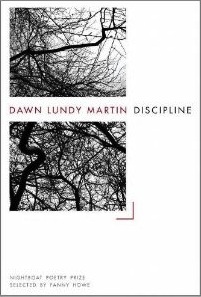Dawn Lundy Martin was part of a group of poets, writers, and scholars who in the mid-2000s taught in Bard College’s Language and Thinking summer program, which requires all incoming Bard freshmen to spend most of August in a classroom five days a week learning to read and write critically. Given that for many students this is their first real time away from home, and they’re out in the woods in the summertime with raging hormones and who knows what kinds of substances, it’s amazing that any of them can sit still for a couple hours, much less three weeks. But the pedagogy is progressive and stimulating (when I used to visit my partner teaching in the program, one of the ur-texts was Rosmarie Waldrop’s “Alarms and Excursions”), and they hire unique and interesting people to teach. I got to know Martin a little bit there.
Author of the 2006 Cave Canem Poetry Prize-winning A Gathering of Matter / A Matter of Gathering and a co-editor of The Fire This Time: Young Activists and the New Feminism, Martin published one of my favorite books of 2011—Discipline, selected by Fanny Howe for the 2009 Nightboat Poetry Prize. A close friend of mine and I like to jokingly debate whether we prefer art that disciplines or gives pleasure, which in turn is a kind of code for more severe, political art versus art that doesn’t feel the need to directly address these concerns. Of course, art can (and maybe should?) do both, but these days I’m more interested in work that enacts a sense of being disciplined—because power always seeks to discipline, including institutional power in the poetry and art worlds—along with resistance to this process. Plenty of poetry talks about politics, but very little poetry performs relations of power. There’s a big difference. And part of it entails addressing submission and complicity.
“I simplify things by pretending to resist,” Martin writes in Discipline, and in fact what makes this book so striking—and, I would argue, so important—is its knotted enactment of this dynamic of power and resistance, especially as applied to a racialized and gendered body, the subject as (extra-)subjected to: “You can take what they give you or you can fuck the whole world maybe even yourself. Just open the mouth square and press pills toward back of tongue tube the throat and imagine an easy procedure. Everything’s digital now and precise. Nothing to fear. Date rape won’t ruin you. The I is a condensed system.” Despite the primarily prose poem format, this is writing meant to feel constricted, as momentary freedoms are curbed by further constraints: “The I is / more relaxed / when it is hunted.” I would also say haunted, and Discipline is haunted by a nightmare of history both personal and collective.
Alan Gilbert is the author of the poetry collections The Everyday Life of Design (Studio, 2020), The...
Read Full Biography


